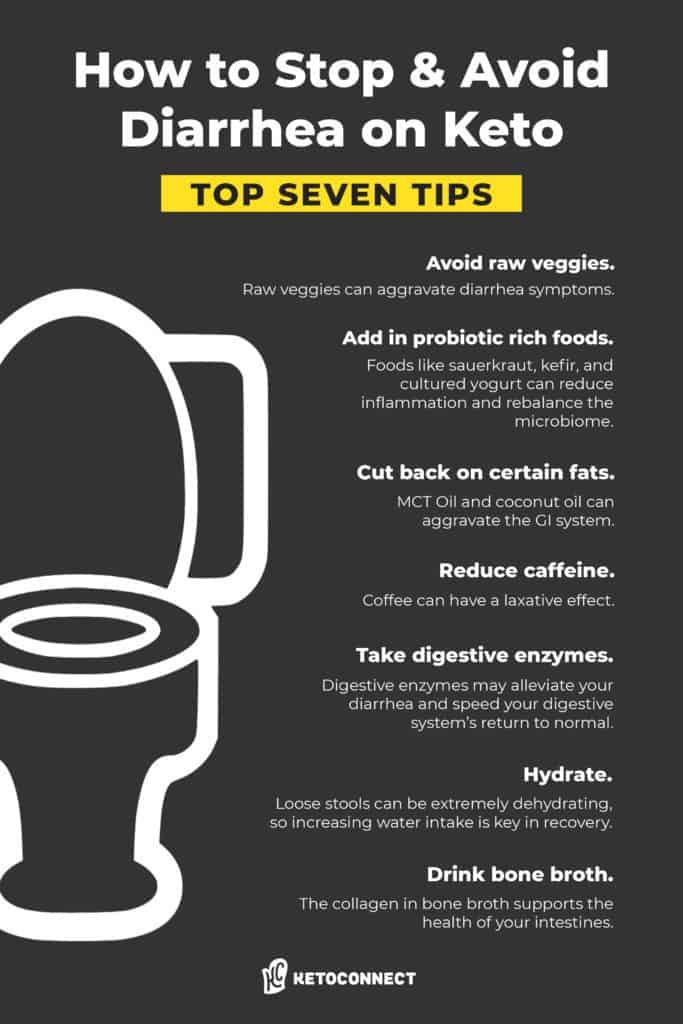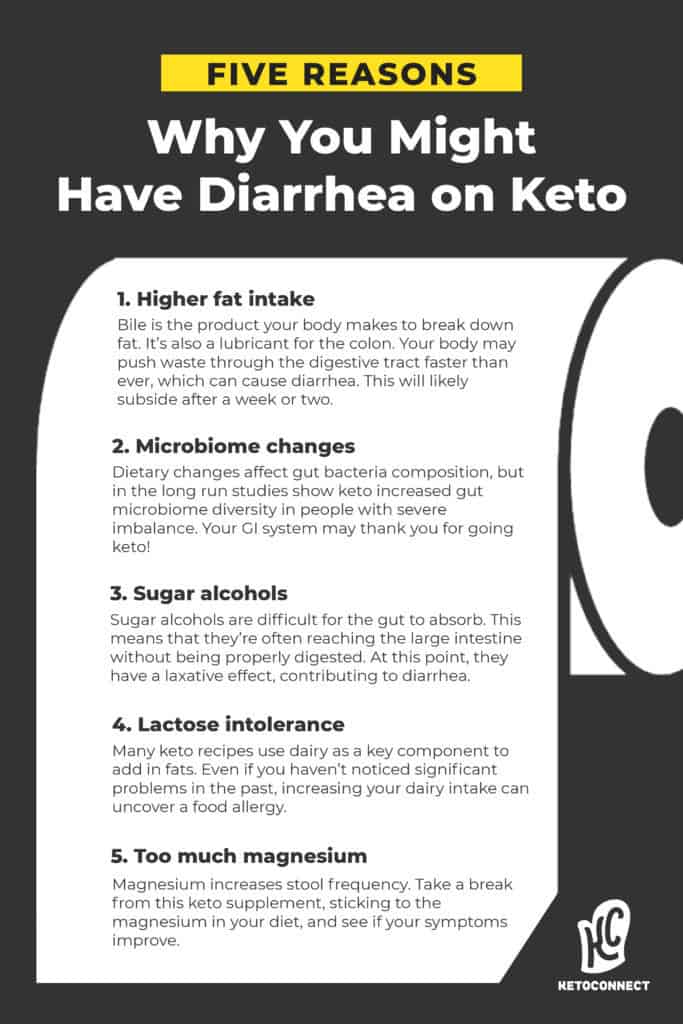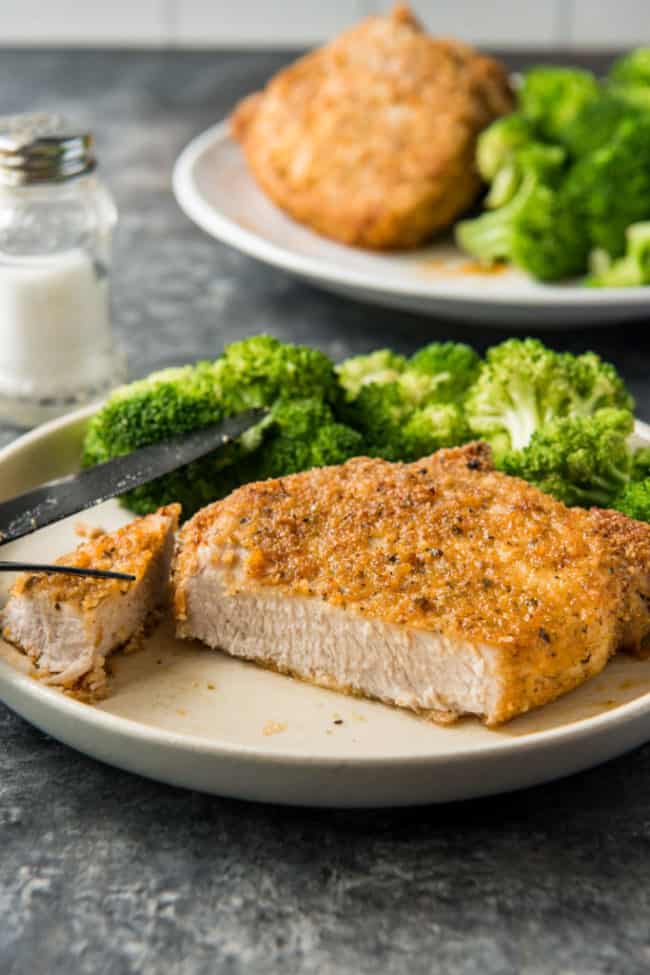A keto diet is an incredible choice for weight loss, more energy, and creating a healthier, happier life.
However, it’s hard to live that new life stuck inside the bathroom.
Unfortunately, one unpleasant issue that can pop up alongside your new low-carb, high-fat lifestyle is diarrhea.
While this poop problem can be highly unpleasant, it doesn’t have to happen to you. Even if it does, you can take steps to stop the flow and start enjoying your ketogenic diet again!
Read on as we talk through how to avoid and stop keto diarrhea, as well as some causes you may not expect.
Can keto cause diarrhea?
Of course, if you are experiencing these symptoms or gearing up to start a keto diet, you’ll likely find yourself asking if it’s treatable or temporary. The short answer is yes.
Here are a few factors of keto that can lead to tummy trouble.

Higher Fat Intake
The simplest reason you may be experiencing digestive issues is the high-fat diet your body is now powered by. A ketogenic diet is a huge adjustment from the Standard American Diet, and your body needs some time to modify its processes, especially bowel movements.
Bile is the product your body makes to break down fat. It’s also a lubricant for the colon. So, your body may be pushing waste through your digestive tract faster than ever, which can cause diarrhea. As your body adjusts to this new fuel source, fat, your diarrhea will likely subside after a week or two.
Microbiome Changes
Dietary changes affect gut bacteria composition. Starting a keto meal plan certainly affects your microbiome, particularly in the stomach and intestines. As you can imagine, once the digestive tract is affected, your poop is too.
There’s good news, though. One study found that keto increased gut microbiome diversity in the long run, after five to six months in people with severe imbalance. Typically, the more diversity of gut microbes, the better the digestion is.
So, though this may be a short-term issue, in the long run, your GI system may thank you for going keto!
Keto Flu Side Effects
Diarrhea can accompany other side effects like nausea, bloating, headaches, fatigue, and decreased appetite in a phenomenon known as the “keto flu.”
In one study, 40% of participants experienced keto diarrhea at some point. However, the benefits far outweighed temporary loose stools and keto flu symptoms.
Again, there’s a positive aspect: these symptoms can subside in one to two weeks if you continue with a ketogenic diet (no “cheat days”), replenish your electrolytes, and avoid strenuous activity. Take care of your whole body, and your digestive system will thank you.
Sneaky Culprits Behind Keto Diarrhea
However, don’t be too quick to place the blame solely on your new eating plan. There are some other, less obvious culprits that may be creating your bowel movement blues.
Sugar Alcohols
If you’ve been on keto, you already know that not only can natural sugar derail your net carbs for the day, but added sugar is terrible for your overall health — particularly, your digestion. In an attempt to avoid it, many keto products and recipes feature sugar alcohols or other artificial sweeteners as a substitute.
Here’s the problem: many sugar substitutes, like sugar alcohols, can cause gastrointestinal disturbances in people unaccustomed to consuming them. Look for ingredients like sorbitol, erythritol, maltitol, or xylitol. These are typically used to cut down on carbs from sugar, but can do more than just lower your carb intake.
Sugar alcohols are difficult for the gut to absorb. This means that they’re often reaching the large intestine without being properly digested. At this point, they have a laxative effect, contributing to diarrhea.
If keto diarrhea strikes, look at how many sugar alcohols and substitutes you’re consuming. (A side note: some sugar alcohols (like maltitol) can still raise blood sugar in large amounts).
Lactose Intolerance
Many keto recipes use dairy as a key component to add in fats. This is no problem… unless you have a lactose intolerance. Even if you haven’t noticed significant problems in the past, increasing your dairy intake can uncover a food allergy.
In fact, diarrhea is a major symptom of lactose intolerance. If your keto diarrhea doesn’t improve over time, you may want to get allergy testing or try an elimination diet.
Incorrect Macros
Keto is meant to be a low-carb, moderate protein, and high-fat diet. Nevertheless, many inexperienced keto dieters end up eating high-protein and moderate fat instead. Without the proper macros, poop problems may arise.
If protein intake is higher than fat, this can not only cause diarrhea, but keep the body from entering ketosis. It’s important to be vigilant about looking at your ratios of carbs, fat, and protein, especially when starting this eating plan, in order to prevent diarrhea.
Too Much Magnesium
One of the primary issues that new keto dieters encounter is an electrolyte imbalance. As the body flushes out stored water weight and adapts to running off of fats, it can lose a lot of electrolytes (which is part of the icky feeling of the keto flu).
In order to counteract this effect, most people take extra magnesium to refill their electrolyte supplies. However, magnesium increases stool frequency– the exact opposite of what diarrhea sufferers want. Take a break from this supplement, sticking to the magnesium in your diet, and see if your symptoms improve.
How to Stop Keto Diarrhea
So, now you know what may be contributing to your bathroom bombshells. What do you do to stop it? You have multiple options, depending on the source of the digestive issue:
- Avoid munching on raw veggies, which can aggravate diarrhea symptoms.
- Add in probiotic-rich foods like sauerkraut, kefir, and cultured yogurt that can reduce inflammation and rebalance the microbiome.
- Cut back on on coconut oil and MCT oil, which can aggravate the GI system further.
- Reduce caffeine, which can have a laxative effect.
- Taking digestive enzymes may alleviate your diarrhea and speed your digestive system’s return to normal.
- Hydrate to avoid further complications — loose stools can be extremely dehydrating, so increasing water intake is key for recovery. Aim for half your body weight in ounces.
- Something that may alleviate a few keto flu symptoms is taking exogenous ketones while transition to a keto diet. This is primarily helpful if you’re just starting the diet due to their high mineral content.
Prevent Constant Diarrhea on Keto
Add in some bone broth to support the health of your intestines. If you suspect your protein intake is too high, add in more healthy fats like avocados or olive oil. Make sure you’re getting enough probiotics, ideally in your diet, though supplements are also an option.
Just because keto is a high-fat diet doesn’t mean all bets are off for nutrition. Be sure you’re still getting enough vegetables, not overloading on dairy, and watching out for large quantities of sugar substitutes. These simple adjustments can help prevent constant keto diarrhea.
Other Keto Diet Poop Problems
Other than diarrhea, constipation is the other frequent offender when it comes to keto diet poop problems. At the root of it, fiber intake is often to blame. It’s very common to suffer from a lack of fiber when switching to the keto diet from the SAD (Standard American Diet, which has a very appropriate abbreviation).
Most American adults already eat less than the daily recommended amount of fiber. The American Heart Association recommends 25-30 grams daily, but the average American only gets 15. Now, factor in that the Standard American Diet gets a large portion of its fiber from grains, and that the keto diet is low-carb. See the problem?
It’s not as easy as just adding more fiber into your diet and your poop problems will be solved. The issue likely stems from the fact that you have drastically changed the amount of fiber in your diet in a short period of time. Your body takes a while to adjust to the fiber amount you are feeding it.
You can try soluble fiber supplements if constipation is an issue, or add in high-fiber vegetables and foods to create a diet you can sustain for the long haul. Broccoli, flaxseed, chia seeds, leafy greens, and bell peppers can be eaten in moderation while staying low-carb. It is best to slowly change the amount of fiber in your diet rather than making dramatic changes.
Hydration and probiotics, as recommended above, will also help with constipation and regulating any stool issues. Supplementing magnesium can also help. (for the same reasons that it’s not recommended for diarrhea).

In Summary
- Keto diarrhea isn’t always talked about, but it’s one of the common side effects of the ketogenic diet. Nevertheless, it’s preventable and can be treated.
- The keto diet can contribute to these tummy troubles in the beginning stages as the body adapts to a high-fat diet, changes occur in the microbiome, or keto flu symptoms manifest.
- Other sneaky culprits behind keto diarrhea can include sugar alcohols, lactose intolerance, incorrect macros, or too much magnesium.
- There are many steps that will help avoid or stop keto diarrhea: avoiding raw veggies, adding in digestive enzymes and probiotics, skipping MCT oil and coconut oil until symptoms subside.
- Preventing any future poop problems can include adding in healthy fats, eating a probiotic-rich diet, and limiting sugar substitutes.
- Constipation, another issue that can happen at times, can be lessened by hydrating well, and supplementing with magnesium and salt.
Sources
- Godoy-Vitorino, F. (2019). Human microbial ecology and the rising new medicine. Annals of translational medicine, 7(14). Full text: https://www.ncbi.nlm.nih.gov/pmc/articles/PMC6694241/
- Swidsinski, A., Dörffel, Y., Loening-Baucke, V., Gille, C., Göktas, Ö., Reißhauer, A., … & Bock, M. (2017). Reduced mass and diversity of the colonic microbiome in patients with multiple sclerosis and their improvement with ketogenic diet. Frontiers in microbiology, 8, 1141. Abstract: https://www.ncbi.nlm.nih.gov/pubmed/28702003?dopt=Abstract%EF%BB%BF
- Westman, E. C., Yancy, W. S., Mavropoulos, J. C., Marquart, M., & McDuffie, J. R. (2008). The effect of a low-carbohydrate, ketogenic diet versus a low-glycemic index diet on glycemic control in type 2 diabetes mellitus. Nutrition & metabolism, 5(1), 36. Full text: https://www.ncbi.nlm.nih.gov/pmc/articles/PMC2633336/
- Kruis, W., Forstmaier, G., Scheurlen, C., & Stellaard, F. (1991). Effect of diets low and high in refined sugars on gut transit, bile acid metabolism, and bacterial fermentation. Gut, 32(4), 367-371. Full text: https://www.ncbi.nlm.nih.gov/pmc/articles/PMC1379072/
- Mäkinen, K. K. (2016). Gastrointestinal disturbances associated with the consumption of sugar alcohols with special consideration of Xylitol: scientific review and instructions for dentists and other health-care professionals. International journal of dentistry, 2016. Abstract: https://www.ncbi.nlm.nih.gov/pubmed/27840639
- Bilsborough, S., & Mann, N. (2006). A review of issues of dietary protein intake in humans. International journal of sport nutrition and exercise metabolism, 16(2), 129-152. Abstract: https://www.ncbi.nlm.nih.gov/pubmed/16779921
- Benninga, M. A., Vandenplas, Y., & MENA Infant Constipation Study Group. (2019). The Magnesium-Rich Formula for Functional Constipation in Infants: a Randomized Comparator-Controlled Study. Pediatric gastroenterology, hepatology & nutrition, 22(3), 270-281. Abstract: https://www.ncbi.nlm.nih.gov/pubmed/31110960
- Shadnoush, M., Hosseini, R. S., Mehrabi, Y., Delpisheh, A., Alipoor, E., Faghfoori, Z., … & Moghadam, J. Z. (2013). Probiotic yogurt affects pro-and anti-inflammatory factors in patients with inflammatory bowel disease. Iranian journal of pharmaceutical research: IJPR, 12(4), 929. Abstract: https://www.ncbi.nlm.nih.gov/pubmed/24523774
- Hopman, W. P., Jansen, J. B., Rosenbusch, G., & Lamers, C. B. (1984). Effect of equimolar amounts of long-chain triglycerides and medium-chain triglycerides on plasma cholecystokinin and gallbladder contraction. The American journal of clinical nutrition, 39(3), 356-359. Abstract: https://www.ncbi.nlm.nih.gov/pubmed/6695835
- National Collaborating Centre for Women’s and Children’s Health (UK. (2009). Diarrhoea and vomiting caused by gastroenteritis: diagnosis, assessment and management in children younger than 5 years. Abstract: https://www.ncbi.nlm.nih.gov/books/NBK63845/
- Abdullah, M. M., Gyles, C. L., Marinangeli, C. P., Carlberg, J. G., & Jones, P. J. (2015). Dietary fibre intakes and reduction in functional constipation rates among Canadian adults: a cost-of-illness analysis. Food & nutrition research, 59(1), 28646. Full text: https://www.ncbi.nlm.nih.gov/pmc/articles/PMC4677277/
Written by
Matt Gaedke
Matt is a former college basketball player turned computer engineer who discovered his passion for health and nutrition after cutting sugar from his diet in 2016. That year he founded KetoConnect with Megha in order to share their ketogenic lifestyle through recipes, videos, and educational content. Matt is always seeking to grow and try new things, a passion he shares with his wife and two amazing sons.

